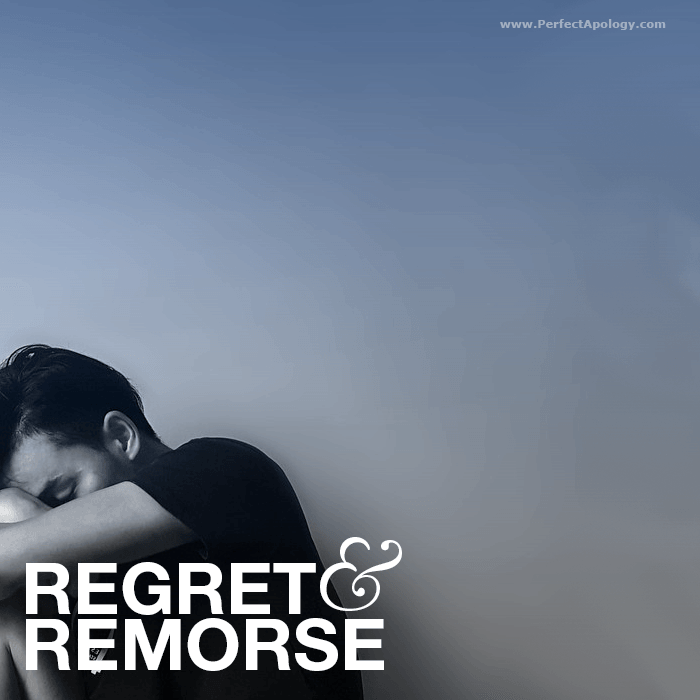Understanding Regret and Remorse
Regret and remorse are profound emotions that stem from the consequences of our actions and decisions. We dive into the differences between these two feelings and the important role that apologies play in addressing them.

To appreciate the crucial role apologies can play in our daily lives it helps to understand the differences between the mistakes we make and the apologies we deliver as a result—some actions we regret, while others we are truly sorry for.
The Anatomy of Regret
Regret is a natural response to the unforeseen outcomes of an event or action. It's that feeling of disappointment and repentance that we all experience when we wish we could turn back time and choose a different path. It's an intelligent reaction to the consequences of our actions, whether intended or not.
In the words of psychologist Daniel Gilbert,
Regret is the payment that the mind makes to reason for a wrong done.
Regret is often linked to relatively minor mistakes or errors, those moments when we wish we could turn back time or choose a different path. It extends to actions we wish we hadn't taken or those we haven't taken but wish we had.
It's the emotional response to the consequences of our decisions.
The Complex Nature of Regret
Regrets are not inherently moral or immoral; it's the outcomes that matter most. Sometimes, we make decisions that were right at the time, but the repercussions for others are adverse.
For instance, an airline issuing an apology for canceling a flight due to unforeseen circumstances or a mechanic expressing regret for unexpected repair costs—these are apologies that address the regrettable consequences of actions that were, in many cases, rational at the time.
In such cases, apologies help to address the regrettable consequences of our actions and maintain relationships, customer relations, and societal values.
In the words of philosopher David Miller,
Regrets are typically amoral—there is no right or wrong associated with the actions; it's the consequences that matter.
From Regret to Remorse: A Deeper Dive
Remorse, on the other hand, is a more complex emotion driven by a strong empathy component. It evokes personal guilt, societal shame, humiliation, resentment, and even anger.
Remorse compels us to steer clear of behaviors that harm or hurt others. Unlike regret, which focuses on good versus bad consequences, remorse centers on right versus wrong actions.
It emerges from serious errors of judgment, prompting the desire for personal change and sacrifice to make amends. Psychologist Lawrence J. Walker says,
Remorse is about recognizing that our actions were wrong and feeling compelled to take responsibility for the pain they've caused.
The Power of Apologies: Bridging Regret and Remorse
Apologies play a pivotal role in addressing both regret and remorse. They offer a path to acknowledge our actions, express genuine remorse when necessary, and work towards making amends.
Through apologies, we can navigate the complex landscape of human emotions, fostering understanding and healing. As Victor Hugo aptly put it,
Remorse is the pain of sin.
Apologies offer a way to alleviate that pain and forge a path towards redemption.
Regret & Remorse FAQ [Frequently Asked Questions]
Our regret FAQs are designed to help us better understand the various types of feelings we experience when we feel that sense of disappointment and repentance after an event or action is taken.
What is the definition of regret?
Oxford Languages defines regret as "a feeling of sadness, repentance, or disappointment over something that has happened or been done." We support this definition and expand on it by explaining the subtleties of regret in all its forms in our article on regret & remorse.
What are synonyms of regret?
Given its many forms, regret synonyms describe the many different emotions and feelings that live under the umbrella of regret, including but not limited to:
feelings of remorse, contrition, repentance, guilt, penitence, shame, anguish, grief, sorriness, pangs of conscience or guilt, self-condemnation.
How to deal with regret?
Just like the definitive steps in formulating a sincere apology, there are several clear steps you can take to deal with regret.
1. Face the reality of the situation, specifically what about the situation you regret
2. Forgive yourself because self-forgiveness is the only key to moving forward
3. Makes amends with a hearfelt apology if you've hurt others or a form of restitution if the situation warrants it.
4. Look to the future, forget about the past. We can't change the past but we can learn from it for the future.
How to get over regret?
Once you've dealt with your feelings of regret by facing the reality of what caused them and then forgiving yourself and making amends, you then need to look the future.
To truly move forward you need to look at things from a different perspective and turn that regret into a positive. This is achieved by looking for opportunities to turn your regret into gratitude.
Be grateful for the lessons learned, be grateful that you can apply those lessons to future decisions and actions, be grateful for the opportunities and self awareness that regret has afforded you.
Thoughts of "I could've", "should've", done or said this or that in the past, turns into "I can" and "I will" in the future. By viewing regret as something to be grateful for, you will not only be able to get over your regret but also move past it.
Review our selection of regret quotes and our collections of quotes on remorse and forgiveness.
1 William Ian Miller (2005) Faking It. London: Cambridge University Press.
2 Walker, L. J. (2016). The Psychology of Regret and Disappointment. In D. K. Sherman & R. F. Baumeister (Eds.), The Psychology of Regret (pp. 1-14).


